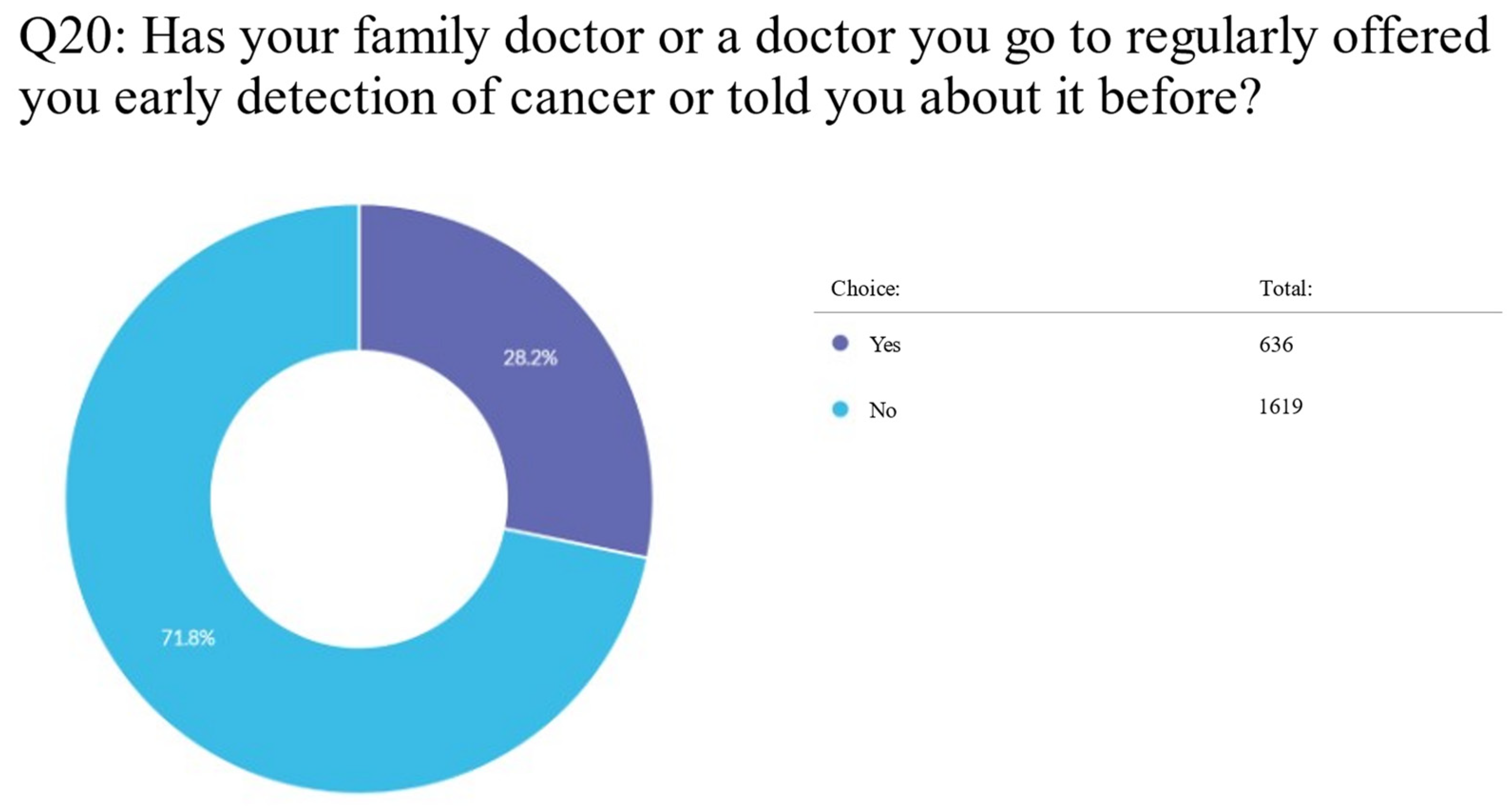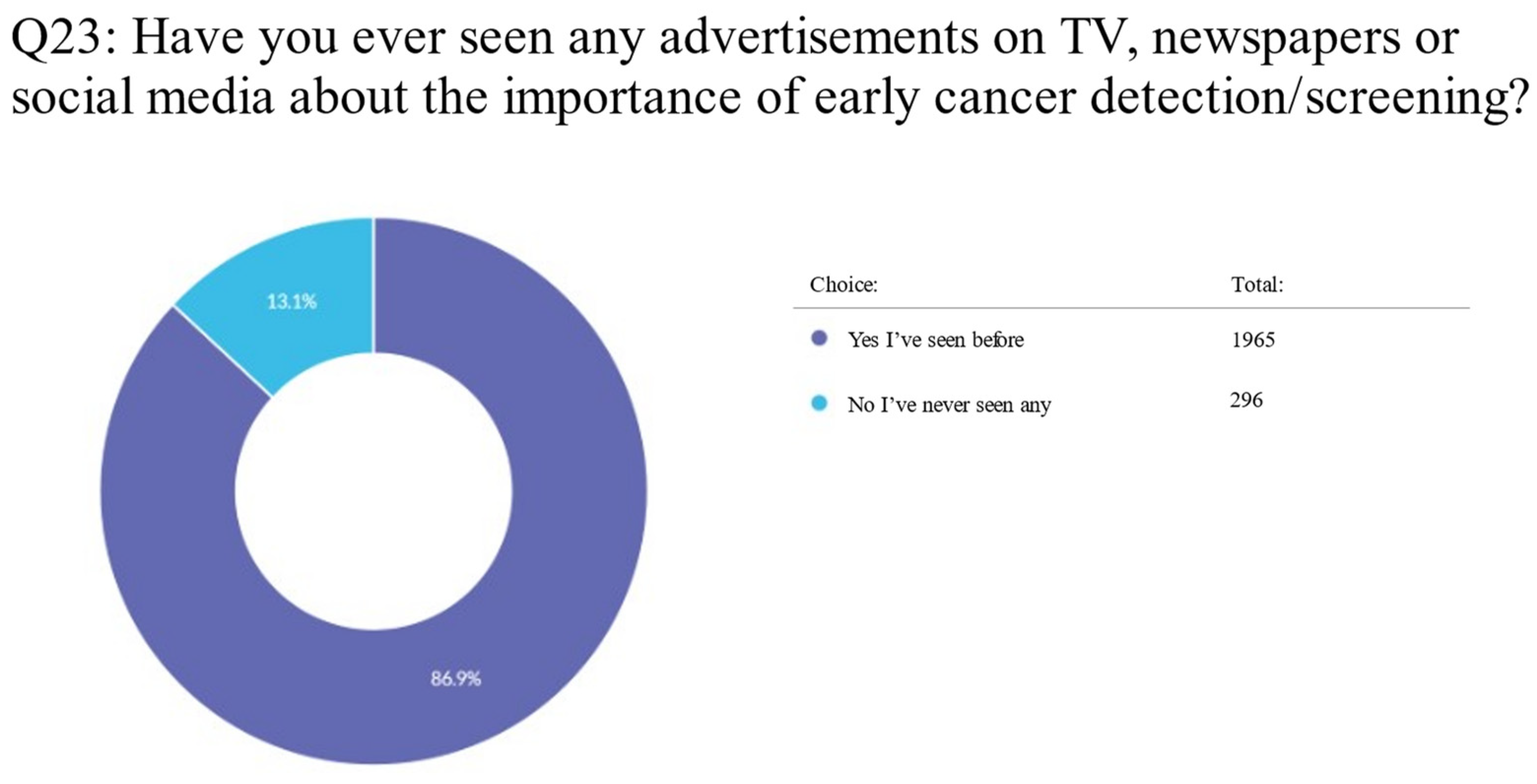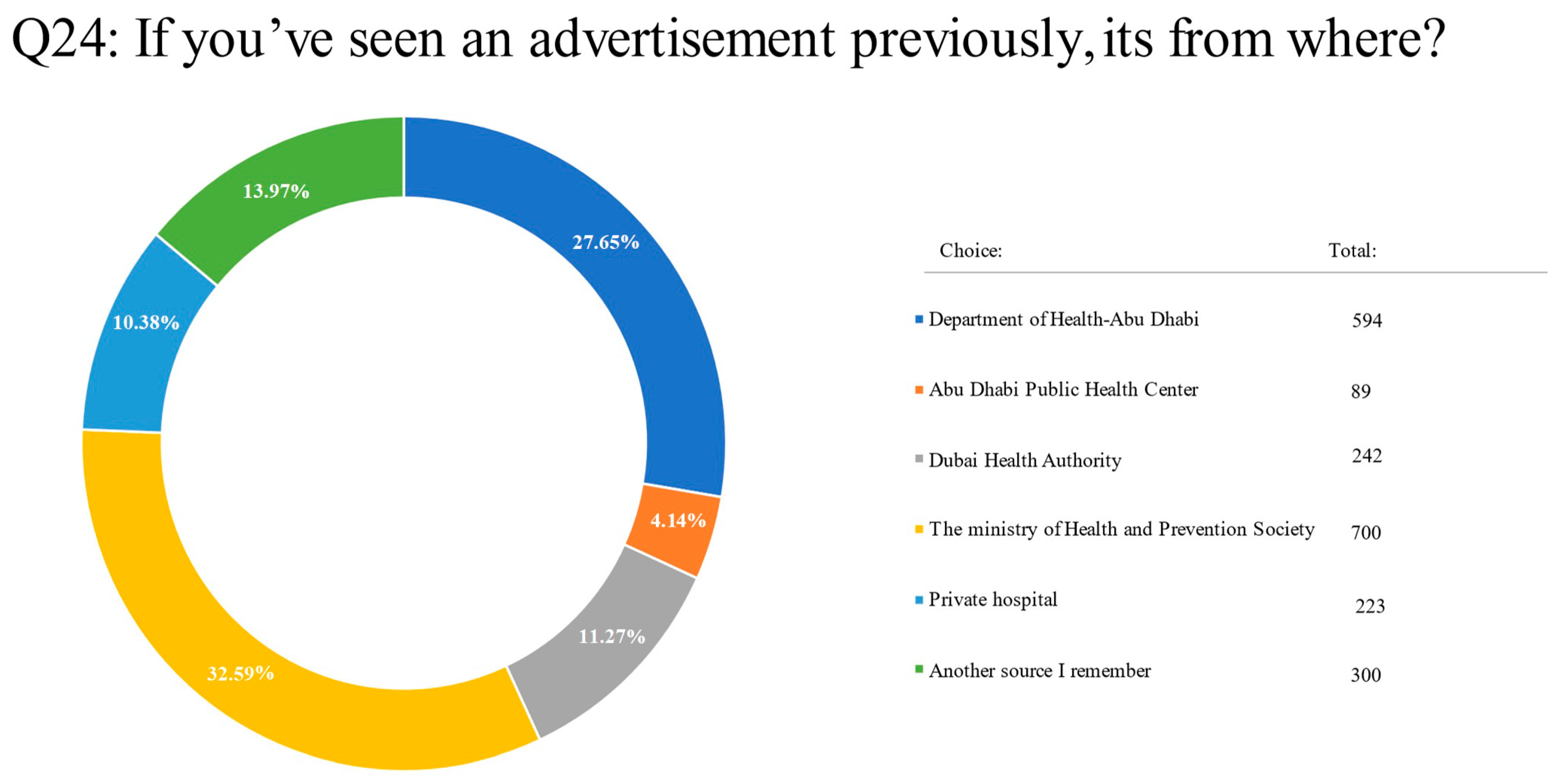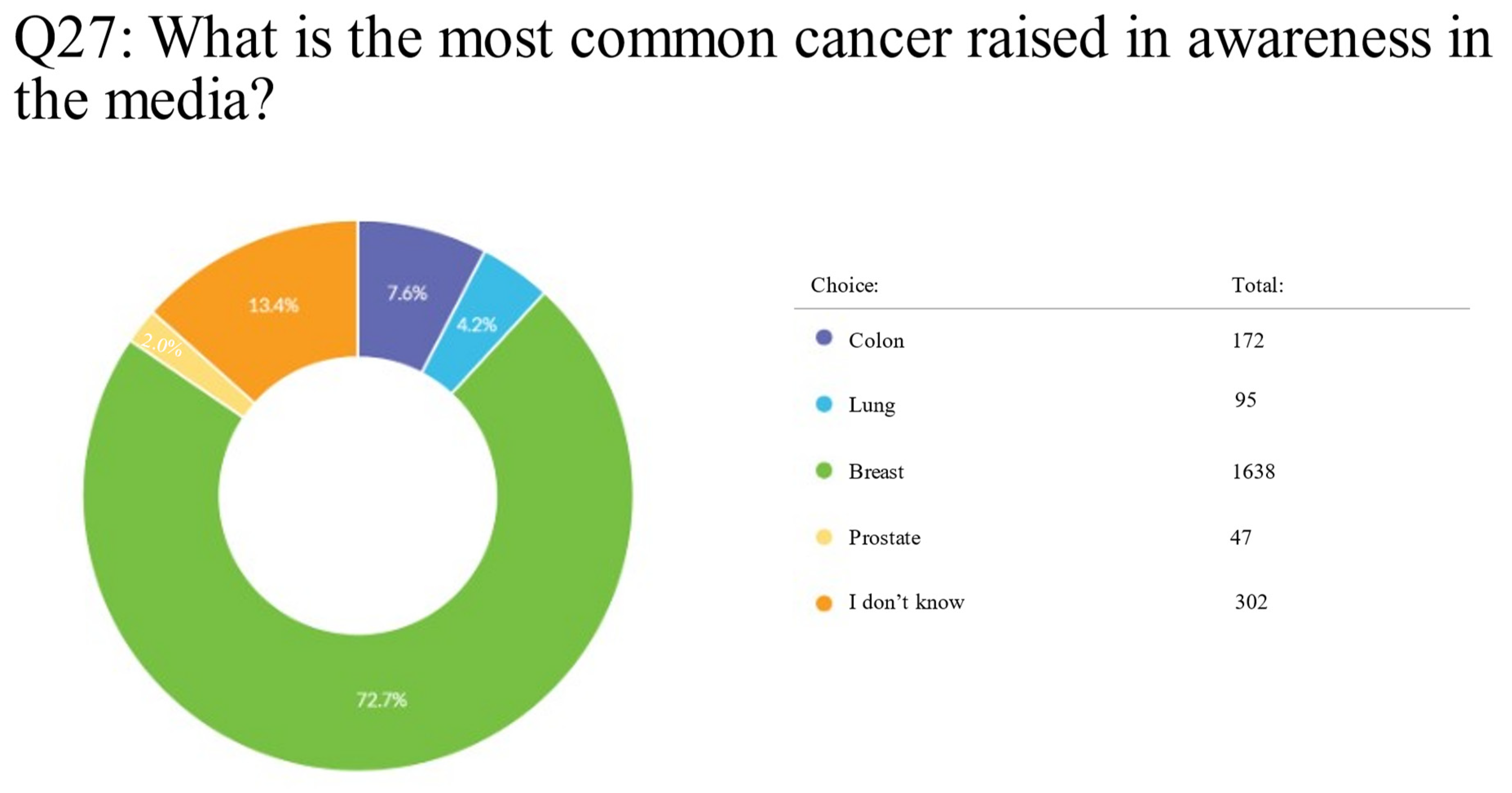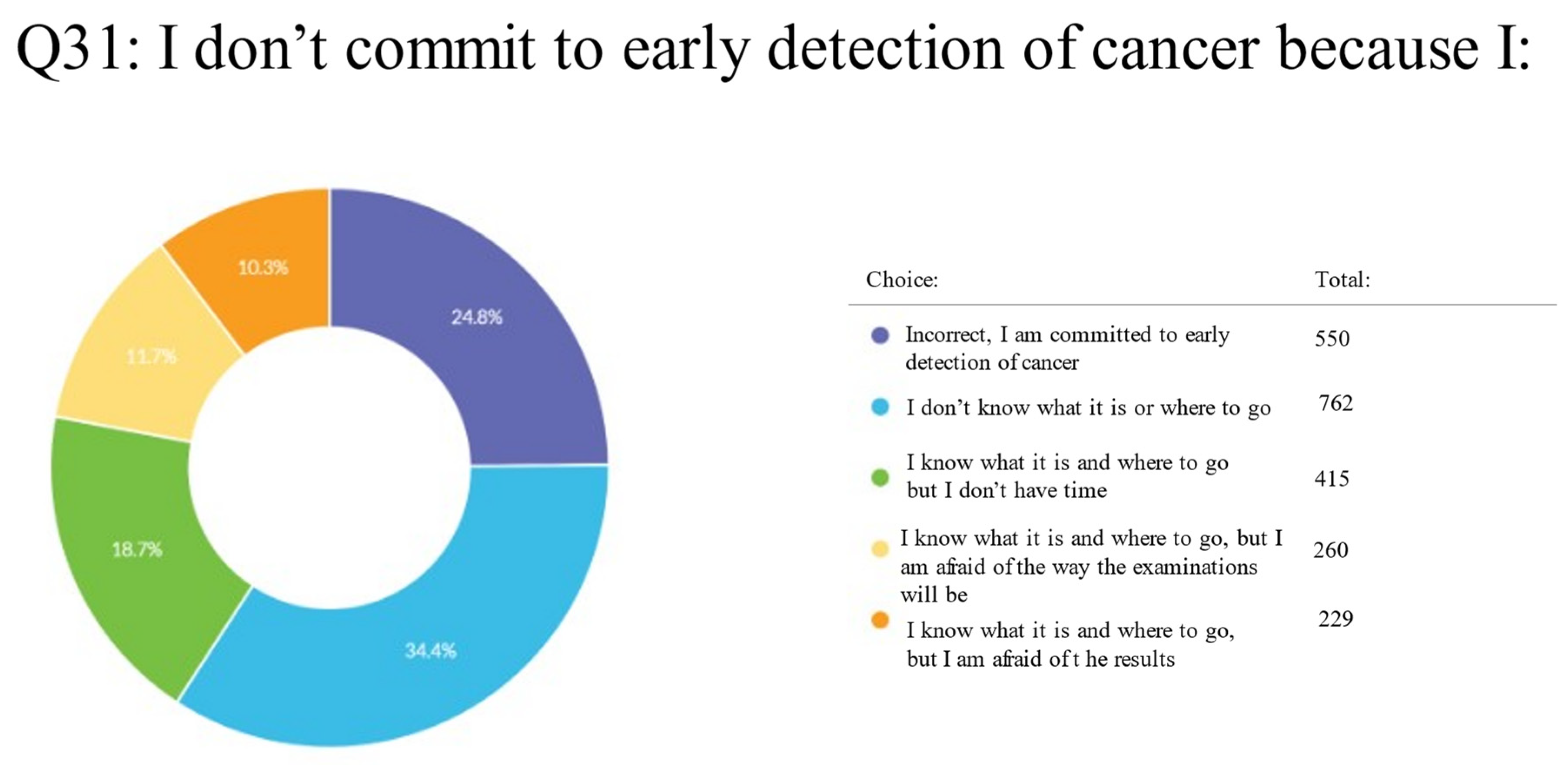Abstract
The United Arab Emirates (UAE) has one of the fastest growing economies in the world, which has resulted in an increase in the detection of noncommunicable diseases such as cancer. Despite its screening and early detection efforts falling short of the target coverage of the intended population, the number of reported cases and deaths in UAE has increased over the years. A few studies have been conducted to understand the hurdles to cancer screening in UAE, mostly focusing on breast and colorectal malignancies. There are no studies or surveys that have addressed the barriers and hurdles to overall cancer screening in UAE’s population. Through this is the largest survey to date, we aimed at assessing UAE society’s perception of cancer and early screening and detection. The survey was constructed using the SurveyPlanet platform. The survey was then distributed on social media for direct and snowball sampling, including Instagram, WhatsApp, LinkedIn, Meta (Facebook), and Twitter. Interestingly, 71.3% of the respondents reported that they were fine mentioning or discussing cancer, while 28.2% reported that they were not comfortable with it. Moreover, 91.8% of the respondents knew the meaning of the early detection or screening of cancer, while 8.2% did not. The ability of respondents to correctly identify different types of cancer screening varied. This study suggests that regulatory authorities need to raise more awareness about cancer, especially among younger generations, and create screening recommendations and guidelines that should include younger people. Lastly, hospitals, cancer charity organizations, educational institutes, and the media should address target audiences to raise cancer awareness among them.
1. Introduction
Cancer continues to be a major health issue in the United Arab Emirates (UAE), accounting for its third leading cause of death [1]. With a projected increase in UAE’s cancer burden of 300% by 2040 [2], early detection and screening remain the most critical weapons in our fight against cancer, both globally and regionally [2]. Despite the availability of cancer screening for breast, colorectal, and cervical cancers in UAE, according to data from UAE Ministry of Health and Prevention, screening uptake remains very low [1]. Such a low uptake can be explained by poor public awareness, difficulties in obtaining access to cancer screening centers, and other social stigmas about cancer [3]. A few studies have tried to address the barriers to cancer screening in UAE, mostly with a focus on breast and colorectal cancers [3,4,5,6]. To our knowledge, there are no studies or surveys that have addressed these barriers to overall cancer screening in UAE’s population, without focusing on a specific cancer.
With this background, we conducted a survey aimed at evaluating UAE society’s perception of cancer and early screening and detection.
2. Methods
The survey was constructed using the SurveyPlanet platform. The survey was then piloted with 10 participants, and feedback was used to clarify some of the questions and make them easier for the participants to understand. The survey was then published for direct and snowball sampling on social media, including Instagram, WhatsApp, LinkedIn, Meta (Facebook), and Twitter. The invitation to participate in the survey made it clear that it was only for UAE residents. The first question in the survey was also used to filter non-UAE residents out of the questionnaire. The participants were also invited to invite others to participate.
3. Results
The exact number of invitees is unknown due to the nature of the invitation on social media. The total number of respondents was 2268, with 1378 (60.9%) being female and 886 (39.1%) being male. The age group between 21 and 40 years was the most commonly represented (n = 1000, 44.1%), followed by the age groups from 41 to 50 years (n = 790, 34.8%), 51–60 years (n = 342, 15.1%), >60 years (n = 85, 3.7%), and <20 years (n = 52, 2.2%) (Appendix A; Q2). Regarding their smoking statuses, 1799 participants (79.7%) were never smokers, 354 (15.7%) were active smokers, and 105 (4.7%) were ex-smokers (Appendix A; Q5).
3.1. Talking about Cancer
A total of 1621 participants (71.3%) reported that they were fine mentioning and/or discussing cancer, while 638 (28.2%) reported that they were not comfortable mentioning or discussing cancer. In total, 9 participants (0.5%) did not respond to this question (Appendix A; Q6). A total of 465 (21.6%) respondents reported they were uncomfortable mentioning cancer because it brought back bad memories of cancer that they would rather forget, either personal or with regard to family members, while 465 (20.9%) respondents reported that they were uncomfortable mentioning cancer because they got anxious about the word, and the remaining 1277 (57.4%) respondents said they did not mind mentioning the word cancer (Appendix A; Q7).
When asked if the respondents knew anyone with a cancer diagnosis, 1346 participants (59.4%) said that they had been diagnosed with cancer or had a relative who had been diagnosed with cancer. A total of 587 (25.9%) respondents reported that someone they knew who was not related to them had cancer, 171 (7.5%) respondents had cancer themselves, and the remaining 161 (7.1%) respondents said they did not know anyone who had cancer (Appendix A; Q8).
3.2. General Knowledge about Cancer and Screening
In evaluating their knowledge about the most common cancers, most respondents (n = 1241, 56.1%) correctly identified breast cancer as the most common cancer, while 702 (31.7%) thought colorectal cancer was the most common cancer, and lung cancer was thought to be the most common by 270 (12.2%) respondents (Appendix A; Q9).
When asked if cancer only affects people who have a positive family history with cancer, 1959 (87%) respondents correctly disagreed with this statement, while 293 (13%) people incorrectly agreed with this statement (Appendix A; Q10). When asked about understanding the meaning of the “early detection/screening of cancer”, 2077 (91.8%) responded “yes”, while 185 (8.2%) said “no” (Appendix A; Q11). When asked whether “cancer screening should be only done if there is a family history”, 2017 (89.4%) respondents correctly disagreed with this statement (Appendix A; Q12).
Regarding the age for starting cancer screening, 883 (39%) respondents correctly identified that, for most cancers, cancer screening should start at the age of 40 years if there is no family history, while “any age” was the response with the second most votes, with 439 (19.4%) respondents answering this. The response with the third most votes was “from age 30 years”, with 370 (16.3%) respondents providing this answer. A total of 330 (14.6%) people said they did not know, 154 (6.8%) said people should start at around the age of 20 years, and the remaining 90 said around the age of 50 years (Appendix A; Q13).
A total of 1610 (71.5%) respondents disagreed with the statement that the early detection of cancer is only performed if there are signs and symptoms of cancer, while 643 (28.5%) agreed with the statement (Appendix A; Q14).
3.3. Organ-Specific Screening
A total of 2202 (97.6%) respondents agreed that there is early breast cancer detection screening, while 53 (3.4%) said there is none (Appendix A; Q15). A total of 1528 (68.5%) respondents incorrectly and 703 (31.5%) correctly responded that there is no early stomach/gastric cancer detection screening method (Appendix A; Q16). A total of 1520 (68.3%) respondents correctly identified that there is early lung cancer detection screening, but 706 (31.7%) said that there is none (Appendix A; Q17). A total of 1801 (80.5%) respondents agreed and 435 (19.5%) disagreed that there is early colon cancer screening (Appendix A; Q18). A total of 1349 (60.8%) respondents said that there is early pancreatic cancer detection screening, while the remaining 868 (39.2%) reported, correctly, that there is none (Appendix A; Q19) (Table 1).

Table 1.
Survey of different types of cancer detection screening knowledge among participants.
3.4. Healthcare Providers’ Role in Cancer Screening
A total of 1619 (71.8%) respondents reported that they had never been informed or invited by their family doctor or the doctor they saw on a regular basis to have an early screening for cancer, or that they had been told about it before, whereas 636 (28.2%) respondents said that they had been told about or offered cancer screening (Appendix A; Q20) (Figure 1).
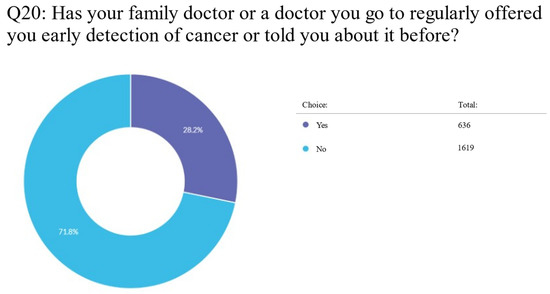
Figure 1.
Pie chart of whether participants reported being offered early detection of cancer by their family doctor.
For the question of whether their doctor should raise more awareness about the importance of the early detection of cancer, 1942 (86.6%) respondents said “yes”, while 301 (13.4%) said “no” (Appendix A; Q21). For the question of whether they had ever seen any advertisements on TV, in newspapers, or on social media about the importance of early cancer detection or screening, 1965 (86.9%) responded “yes”, while 269 (13.1%) responded “no”, saying they had never seen these advertisements (Appendix A; Q23) (Figure 2).
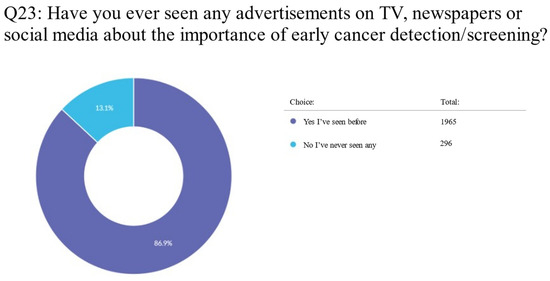
Figure 2.
Pie chart on advertisements about the importance of early cancer detection or screening, according to respondents.
A total of 700 (32.5%) respondents had seen a screening advertisement from the Ministry of Health and Prevention, 594 (27.6%) had seen one from the Department of Health Abu Dhabi, 242 (11.2%) had seen one from the Dubai Health Authority, 223 (10.38%) had seen one from a private hospital, and 89 (4.14%) had seen one from the Abu Dhabi Public Health Center. In addition, 300 (13.9%) respondents said they had seen advertisements from other sources (Appendix A; Q24) (Figure 3).
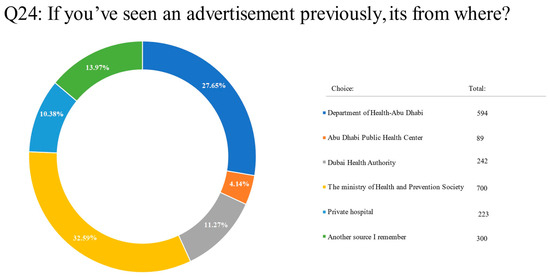
Figure 3.
Pie chart on seeing advertisements from a number of healthcare platforms for cancer screening, according to respondents.
A total of 2159 respondents (96.8%) suggested that there should be continuous media coverage to raise awareness about cancer and the early detection of cancer, and 71 (4.2%) said there should not be (Appendix A; Q26). When asked “do we need to change our mindset about cancer & early detection and screening?”, 2074 participants (91.9%) agreed with this statement and 152 (6.7%) were not sure, while 31 (1.4%) respondents disagreed.
3.5. Screening Program Awareness
The survey takers had to choose what was the most common cancer receiving awareness in the media, and the results were: breast cancer with a total of 1638 (72.7%) votes, colon cancer with a total of 172 (7.6%) votes, lung cancer with a total of 95 (4.2%) votes, and prostate cancer with a total of 47 (2.1%) votes, while the remaining respondents were not sure (n = 302, 13.4%) (Appendix A; Q27) (Figure 4).
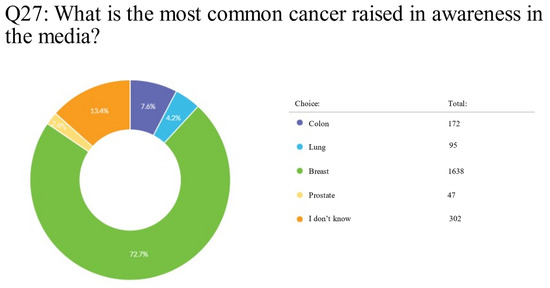
Figure 4.
Pie chart of the most frequently mentioned cancers in the media in UAE, according to respondents.
We also asked if there are any free programs for UAE citizens for the early detection of cancer, and 1462 participants (65.3%) responded “yes”, while 776 (34.7%) responded that there were none according to their knowledge (Appendix A; Q28).
Regarding whether there are any free programs for residents (non-citizens) for the early detection of cancer, 896 respondents (40.2%) reported there is a free program for residents and 1332 (59.8%) said that, to the best of their knowledge, there is none (Q 29).
When asked if “early diagnosis by early detection of cancer increases the chances of cancer cure”, 2128 (94.4%) respondents answered with “yes”, 21 (1.3%) answered “no”, and 106 (4.7%) respondents stated they were not sure (Appendix A; Q30).
3.6. Barriers to Cancer Screening and How to Improve Them
When asked about reasons for not adhering to the early detection of cancer, 762 (34.4%) respondents reported that they did not know what or where to go for this early detection of cancer, 550 (24.8%) said they were committed to the early detection of cancer, 415 (18.7%) said they knew what it was and where to go but did not have the time to do so, 260 (11.7%) said they knew what it was and where to go but were afraid of the way the examinations would be, and 229 (10.3%) said they knew what it was and where to go but were afraid of the results (Appendix A; Q31) (Figure 5).
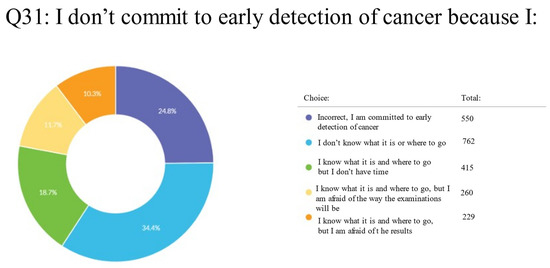
Figure 5.
Pie chart of UAE residents on the reasons for not committing to early cancer detection.
When asked “If there is a simple blood test that does not require any fasting or special preparations and detects many types of cancer without endoscopy or X-rays, then I don’t mind if I do the early detection of cancer on an ongoing basis”, 2100 (93.6%) respondents agreed with this statement, while 114 (5.1%) respondents said they were not sure about it and 29 (1.3%) respondents disagreed (Appendix A; Q32).
When asked if they had previously had any early detection of cancer and its required tests, a total of 893 (42.2%) respondents answered that they were under 40, so they could not answer this, 619 (29.2%) respondents answered that they were above 40 and had undergone the required tests for the early detection of cancer before, and 606 (28.6%) answered that they were above 40 and had not taken the tests for the early detection of cancer before (Appendix A; Q33).
When asked “which of the screening tests have you done before?”, 1191 participants (54.2%) answered that they had not had any previous tests for the early detection of cancer. Mammograms were the most common cancer screening test used by the survey respondents, with 494 people having experienced one (22.5%). A total of 281 (12.8%) respondents reported that they had taken the Pap smear for the early detection of cervical cancer, while 145 (6.6%) reported that they had undergone an endoscopy or occult stool examination for the early detection of colorectal cancer, 67 (3%) had experienced prostate-specific antigen (PSA) testing for prostate cancer, and 21 (0.9%) respondents had computed tomography scans performed for lung cancer screening in smokers (Appendix A; Q34).
Lastly, the respondents were asked if they agreed with the following statement: “The UAE society needs more awareness about cancer, its causes, ways to prevent it, and early cancer detection methods”, and 2194 participants (97.4%) agreed, while 59 (3.6%) disagreed (Appendix A; Q35).
4. Discussion
This is the first and largest survey addressing the knowledge and attitudes toward cancer screening in UAE’s population. Previous surveys have only focused on specific and common cancers such as breast cancer and colorectal cancer. In this large survey, both UAE citizens and non-UAE citizens (residents) were invited to participate. Previous surveys have mostly been performed with direct recruitment from clinics and healthcare settings [3,4,5,6]. We utilized social media for our direct recruitment and the snowball effect to obtain a larger sample. The age distribution of our respondents reflected the demographics of UAE’s population. The populations of the age groups of 25–54 and 55–64 years constitute 6.6 million (66.35%) and 0.5 million (5.8%), respectively, in UAE. The country has 0.1 million people over the age of 65 [7].
In contrast to popular belief, our findings show that the majority of people are fine with mentioning and/or discussing cancer, indicating a significant shift from our experience of not being willing to talk about cancer, to being willing to discuss it. There are no older studies or surveys on the previous level of willingness to talk about cancer to compare with the current findings. In evaluating the responses to the general knowledge about cancer and screening, the responses indicated a good general knowledge about the most common cancers, the role of family history, the need for screening irrespective of family history, and the presence of symptoms. Regarding the age to start cancer screening, around 39% of the respondents correctly identified that cancer screening should start, for most cancers, at the age of 40 years if there is no family history, which indicates a greater focus on the awareness about when to start this screening.
When there is no population-based screening program in place, healthcare providers play an integral part in raising awareness and inviting participants to cancer screening, which is a less effective alternative screening [8]. While the majority of respondents in this survey mentioned that they had never been informed or invited by their family doctor or the doctor they saw on a regular basis to have an early detection of cancer, this should be interpreted with caution, because a considerable number of the respondents were not at screening age.
Social media and technology can do wonders when questions about cancer awareness come in. There are many apps and campaigns that have been launched recently for breast cancer, including “Pink Shield”, launched by Emirates Health Services. Since October is breast cancer awareness month worldwide, UAE’s government, as well as private entities, ensure that maximum awareness is raised among women during this month. In accordance with this, the Abu Dhabi Public Health Centre has teamed up with the global biopharmaceutical company MSD and Deliveroo (a food delivery company) to raise breast cancer awareness. These initiatives are being implemented to promote national attempts to fight breast cancer within the scope of the national policy for reducing cancer mortality rates [9,10].
Federal and private initiatives at UAE’s public level have induced excellent awareness among people, especially the younger generation, since they have a better understanding of new technologies. However, private health organizations in UAE still need to make more efforts to raise cancer awareness.
Our survey also shows, beyond a doubt, that the public has an interest in knowing about cancer, especially through continuous media coverage to raise awareness about cancer and the available programs for the early detection of cancer in the country. UAE’s regulatory authorities are spearheading efforts to build effective cancer screening programs in the country. In 2009, a screening program was launched that recommended all female UAE citizens aged 40 years and over to have annual mammography screenings. Following that, in July 2010, a nationwide colorectal cancer screening program was initiated, and by 2014, three screening programs for breast, colorectal, and cervical cancers had been developed [11,12]. Lastly, with the release of lung cancer data in 2017, low-dose computed tomography scans were used to screen for lung cancer [11,13]. Furthermore, several cancer screening and awareness programs have been launched, such as the “Pink Caravan” event. This annual awareness program, which is aimed at raising breast cancer awareness and encouraging screening, now reaches over 45,000 women in UAE [11,14]. In this survey, we also assessed our population’s knowledge about any free programs for citizens for the early detection of cancer. It was apparent that the UAE residents were less aware of free cancer screening and detection programs than the UAE citizens.
Our survey also showed that, despite the fact that people understand the benefit of early detection in cancer management, a considerable proportion do not know what screening methods are available and where to access them. These results are very significant in terms of addressing the critical issues in cancer screening and early detection pathways. Nothing has a greater impact on the cancer survival rate than screening and early detection. Early cancer detection is thought to increase the likelihood of successful treatment and a better outcome [2]. A dedicated monitoring task force should be established to create a clear pathway for people to let them know where and how to go for cancer screening and should encourage the recruitment of dedicated staff by health organizations that can answer their queries through phone calls or in person. The majority of the people in this survey were hesitant to commit due to the nature of the examination or their fear of the results. A study [15] conducted in Europe also explained these cancer fears. The different facets of cancer fear influence the choice and action processes that lead to screening participation in various ways. Understanding the many behavioral implications of cancer fear may contribute to the development of successful public health messages. The findings of this study suggest that, depending on the component of this fear, cancer fear can be a facilitator or a hindrance.
Learning more about the components of cancer fear and performing more detailed evaluations of its behavioral consequences may aid in the development of successful public health messages in UAE’s healthcare system, too. Our survey illustrates that people are willing to undergo early detection tests when there are simpler alternatives.
According to another local survey, four out of every ten women over the age of 40 have never undergone breast cancer screening. The results of this survey were almost consistent with our study. The primary reasons for this hesitancy were a lack of symptoms (31%), being concerned about the results (26%), having no family history of breast cancer (25%), and feeling uncomfortable [16].
5. Conclusions
The aim of this largest survey to date was to assess the perception and awareness of cancer and cancer screening in the United Arab Emirates. There are few strengths and limitations of this study, including the fact that an online data survey means a controlled cost methodology and faster data collection, whereas the biggest limitation during the survey was the sample size of the population.
The goal of cancer screening is to detect pre-cancer or early-stage cancer in asymptomatic patients so that an earlier diagnosis and treatment can be provided, which can result in better outcomes for some people [17]. This survey was designed to be a quick reference that contains the important subjects of the perception and awareness of cancer screening in UAE’s population. It is anticipated that this study will help policymakers to determine whether there are enough cancer screening and awareness programs in UAE to minimize cancer incidence and mortality. There are several barriers to low cancer screening programs in UAE’s population and regulatory authorities are acting or planning to reform these early cancer screening and detection systems (Table 2) [2]. This survey focuses on key messages for policymakers, including the significance of investing in primary prevention and early detection screening programs. Regulatory authorities should use their available resources to improve cancer screening in order to save the lives of their population.

Table 2.
Barriers and planned activities for promoting early cancer screening in UAE [2].
Author Contributions
Conceptualization, S.H.A.-S., A.H.A.-S. and M.H.A.-S.; writing—original draft preparation, H.O.A.-S.; writing—review and editing, F.I., S.H.A.-S., A.H.A.-S., M.H.A.-S., A.S., M.S.A. and O.A.H.; supervision, H.O.A.-S.; project administration, F.I. All authors have read and agreed to the published version of the manuscript.
Funding
Burjeel Medical City, Abu Dhabi, UAE gave a grant to the authors to cover the cost of article processing charges.
Institutional Review Board Statement
This social media based public survey was conducted by Sarah Humaid Al-Shamsi and Abdulla Humaid Al-Shamsi as part of a school dissertation project under mentor supervision. Institutional Review Board approval was granted for results publication # BH/REC/047/23.
Informed Consent Statement
All participants were invited to participate after being informed of the anonymity, confidentiality, and voluntary nature of participation in line with the privacy policy of SurveyPlanet.
Data Availability Statement
Data can be available from the first author upon reasonable request.
Conflicts of Interest
The authors declare no conflict of interest.
Appendix A
Appendix A shows the complete cancer survey performed for this study.
| No | Question | ||||||
| Q2 | What is your age? | Below 20 | 21–40 | 41–50 | 51–60 | Above 60 | |
| 51 | 1000 | 790 | 342 | 85 | |||
| Q4 | Education level? | Middle School | High School | University—Bachelor’s | University—Master’s | University—PhD or higher degree | |
| 59 | 478 | 1224 | 365 | 140 | |||
| Q5 | Do you smoke currently via cigarettes or hookah or medwakh or vape? | Yes | No | I used to, but I quit smoking | |||
| 354 | 1799 | 105 | |||||
| Q6 | I don’t like talking about or mentioning the word “cancer” | I don’t mind talking about or mentioning the word “cancer” | I don’t like mentioning the word at all | ||||
| 1621 | 638 | ||||||
| Q7 | I don’t like mentioning the word cancer because: | I don’t mind mentioning it | Because I am too anxious to mention it | It brings back bad memories for me or about people I know | |||
| 1277 | 465 | 481 | |||||
| Q8 | Do you know anyone who has had cancer in the past or now? | I was diagnosed with cancer | My relative was diagnosed with cancer | Someone I know was diagnosed with cancer | I don’t know anyone who was diagnosed with cancer | ||
| 171 | 1346 | 587 | 161 | ||||
| Q9 | Most common cancer known in UAE? | Lung | Breast | Colon | |||
| 270 | 1241 | 702 | |||||
| Q10 | Cancer only affects people that have a family history with cancer | Yes | No | ||||
| 293 | 1959 | ||||||
| Q11 | When I hear the sentence “early detection of cancer”, I know what it means | Yes | No | ||||
| 2077 | 185 | ||||||
| Q12 | Early detection of cancer is done only when I have a family history of cancer | Yes | No | ||||
| 238 | 2017 | ||||||
| Q13 | When should a person, whether male or female, start the early detection of cancer if there is no family history of cancer? | Any age | From the age of 20 | From the age of 30 | From the age of 40 | From the age of 50 | I don’t know |
| 439 | 154 | 370 | 883 | 90 | 330 | ||
| Q14 | The early detection of cancer is only done if there are signs. For example, a mass in the breast or pain in the stomach; then we can proceed with colon or breast detection for cancer | Yes | No | ||||
| 643 | 1610 | ||||||
| Q15 | Is there early breast cancer detection screening? | Yes, there is | No there isn’t | ||||
| 2202 | 53 | ||||||
| Q16 | Is there early stomach/gastric cancer detection screening? | Yes, there is | No there isn’t | ||||
| 1528 | 703 | ||||||
| Q17 | Is there early lung cancer detection screening? | Yes, there is | No there isn’t | ||||
| 1520 | 706 | ||||||
| Q18 | Is there early colon cancer detection screening? | Yes, there is | No there isn’t | ||||
| 1801 | 435 | ||||||
| Q19 | Is there early pancreatic cancer detection screening? | Yes, there is | No there isn’t | ||||
| 1349 | 868 | ||||||
| Q20 | Has your family doctor or a doctor you go to regularly offered you an early detection of cancer or told you about it before? | Yes | No | ||||
| 636 | 1619 | ||||||
| Q21 | Do you think that your doctor should raise more awareness of the importance of early detection of cancer? | Yes | No | ||||
| 1942 | 301 | ||||||
| Q22 | We have completed half of the questions and we will continue with the other half. Are the questions simple and smooth till now? | Yes | No | ||||
| 2134 | 123 | ||||||
| Q23 | Have you ever seen any advertisements on TV, in newspapers, or on social media about the importance of early cancer detection/screening? | Yes, I’ve seen before | No, I’ve never seen any | ||||
| 1965 | 296 | ||||||
| Q24 | If you’ve seen an advertisement previously, where was it from? | Department of Health-Abu Dhabi | Abu Dhabi Public Health Center | Dubai Health Authority | The ministry of Health and Prevention Society | Private hospital | Another source I remember |
| 594 | 89 | 242 | 700 | 223 | 300 | ||
| Q25 | Should we change our mindset in UAE when it comes to publicly addressing and considering the early detection of cancer? | Yes | No | Not Sure | |||
| 2074 | 31 | 152 | |||||
| Q26 | I want continuous media coverage to raise awareness about cancer and the early detection of cancer in the country? | Yes | No | ||||
| 2159 | 71 | ||||||
| Q27 | What is the most common cancer raised in awareness in the media? | Colon | Lung | Breast | Prostate | I don’t know | |
| 172 | 95 | 1638 | 47 | 302 | |||
| Q28 | Are there any free programs for citizens for the early detection of cancer? | Yes, there is | There is none according to my knowledge | ||||
| 1462 | 776 | ||||||
| Q29 | Are there any free programs for residents for the early detection of cancer? | Yes, there is | There is none according to my knowledge | ||||
| 896 | 1332 | ||||||
| Q30 | Early diagnosis via the early detection of cancer increases the chances of obtaining better results and chances of recovery | Yes | No | Not Sure | |||
| 2128 | 21 | 106 | |||||
| Q31 | I don’t commit to the early detection of cancer because I: | Incorrect, I am committed to the early detection of cancer | I don’t know what it is or where to go | I know what it is and where to go but I don’t have time | I know what it is and where to go, but I am afraid of the way the examinations will be | I know what it is and where to go, but I am afraid of the results | |
| 550 | 762 | 415 | 260 | 229 | |||
| Q32 | If there is a simple blood test that does not require any fasting or special preparations and detects many types of cancers without endoscopy or x-rays, then I don’t mind if I do the early detection of cancer on an ongoing basis | Yes, I agree totally | I don’t agree | Not sure | |||
| 2100 | 29 | 114 | |||||
| Q33 | Only if you are above 40 can you answer this question. Have you done any early detection of cancer and required tests before? | I am under 40 years old | I am above 40 and I have done the required tests for the early detection of cancer before | I am above 40 and I have not done the required tests for the early detection of cancer before | |||
| 893 | 619 | 606 | |||||
| Q34 | I did previous tests for the early detection of cancer | Mammogram for the early detection of breast cancer | Endoscopy or occult stool examination for the early detection of colon and rectal cancer | Pap smear for the early detection of cervical cancer | Blood test via *PCR* for prostate cancer in men | CT scan for smokers for lung cancer | I haven’t done any of them before |
| 494 | 145 | 281 | 67 | 21 | 1191 | ||
| Q35 | The last question, UAE’s society needs more awareness about cancer, its causes, ways to prevent it, and early cancer detection methods | Yes, I agree | No, I don’t agree | ||||
| 2194 | 59 | ||||||
References
- Al-Shamsi, H.; Darr, H.; Abu-Gheida, I.; Ansari, J.; McManus, M.C.; Jaafar, H.; Tirmazy, S.H.; ElKhoury, M.; Azribi, F.; Jelovac, D.; et al. The State of Cancer Care in the United Arab Emirates in 2020: Challenges and Recommendations, A report by the United Arab Emirates Oncology Task Force. Gulf J. Oncol. 2020, 1, 71–87. [Google Scholar]
- Al-Shamsi, H.O.; Abyad, A.M.; Rafii, S. A Proposal for a National Cancer Control Plan for the UAE: 2022–2026. Clin. Pract. 2022, 12, 118–132. [Google Scholar] [CrossRef] [PubMed]
- Soliman, H.; Zackaria, S.S.; Mohammed, H.R. Breast, cervix and colorectal cancer attitude, knowledge and practice among eligible female health care workers in Umm AL Quwain primary health care centres. Int. Res. J. Public Environ. Health 2021, 8, 48–56. [Google Scholar]
- Rahman, S.A.; Al–Marzouki, A.; Otim, M.; Khayat, N.E.H.K.; Yousef, R.; Rahman, P. Awareness about Breast Cancer and Breast Self-Examination among Female Stu-dents at the University of Sharjah: A Cross-Sectional Study. Asian Pac. J. Cancer Prev. 2019, 20, 1901–1908. [Google Scholar] [CrossRef] [PubMed]
- Meskiri, A.; Al Hosani, A.N.; Al Mazrouei, N.E.; Behl, S. Knowledge of breast cancer and self-diagnostic skills amongst women in the United Arab Emirates. Hamdan Med. J. 2022, 15, 11. [Google Scholar] [CrossRef]
- Al Abdouli, L.; Dalmook, H.; Abdo, M.A.; Carrick, F.; Rahman, M.A. Colorectal Cancer Risk Awareness and Screening Uptake among Adults in the United Arab Emirates. Asian Pac. J. Cancer Prev. 2018, 19, 2343–2349. [Google Scholar] [CrossRef] [PubMed]
- Global Media Insight. Available online: https://www.globalmediainsight.com/blog/uae-population-statistics/#:~:text=The%20population%20of%20children%20between,above%20the%20age%20of%2065 (accessed on 16 November 2022).
- Walsh, B.; Siles, M.; O’Neill, C. The importance of socio-economic variables in cancer screening participation: A comparison between population-based and opportunistic screening in the EU-15. Health Policy 2011, 101, 269–276. Available online: https://openaccess.city.ac.uk/id/eprint/12141/1/ (accessed on 16 November 2022). [CrossRef] [PubMed]
- Emirates Health Services. Available online: https://www.ehs.gov.ae/en/media-center/news/emirates-health-services-launches-pink-shield-app-to-promote-breast-cancer-awareness (accessed on 17 November 2022).
- ADPHC and MSD Team up with Deliveroo to Drive Breast Cancer Awareness. Available online: https://www.timeoutdubai.com/news/adphc-and-msd-team-up-with-deliveroo-to-drive-breast-cancer (accessed on 17 November 2022).
- Abu-Gheida, I.H.; Nijhawan, N.; Al-Awadhi, A.; Al-Shamsi, H.O. General Oncology Care in the UAE. In Cancer in the Arab World; Al-Shamsi, H.O., Abu-Gheida, I.H., Iqbal, F., Al-Awadhi, A., Eds.; Springer: Singapore, 2022. [Google Scholar] [CrossRef]
- The Dubai Health Authority (DHA). Available online: https://www.dha.gov.ae/en/Pages/AboutUs.aspx (accessed on 1 July 2020).
- Department of Health Abu Dhabi. Available online: https://www.haad.ae/simplycheck/tabid/112/Default.aspx (accessed on 1 July 2020).
- The U.A.E. Healthcare Sector: An Update, U.S.-U.A.E. Business Council. Available online: http://usuaebusiness.org/wp-content/uploads/2017/05/Healthcare-Report-Final-1.pdf (accessed on 1 July 2020).
- Vrinten, C.; Waller, J.; von Wagner, C.; Wardle, J. Cancer Fear: Facilitator and Deterrent to Participation in Colorectal Cancer Screening. Cancer Epidemiol. Biomark. Prev. 2015, 24, 400–405. [Google Scholar] [CrossRef] [PubMed]
- Four in 10 Women over 40 in UAE Have Never Had Breast Cancer Screening. Available online: https://www.thenationalnews.com/uae/2022/10/28/four-in-10-women-over-40-in-uae-have-never-had-breast-cancer-screening/ (accessed on 17 November 2022).
- World Health Organization. A Short Guide to Cancer Screening. Increase Effectiveness, Maximize Benefits and Minimize Harm; WHO Regional Office for Europe: Copenhagen, Denmark, 2022. [Google Scholar]
Disclaimer/Publisher’s Note: The statements, opinions and data contained in all publications are solely those of the individual author(s) and contributor(s) and not of MDPI and/or the editor(s). MDPI and/or the editor(s) disclaim responsibility for any injury to people or property resulting from any ideas, methods, instructions or products referred to in the content. |
© 2023 by the authors. Licensee MDPI, Basel, Switzerland. This article is an open access article distributed under the terms and conditions of the Creative Commons Attribution (CC BY) license (https://creativecommons.org/licenses/by/4.0/).

